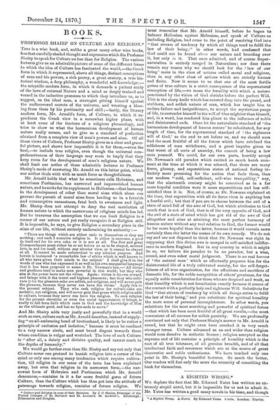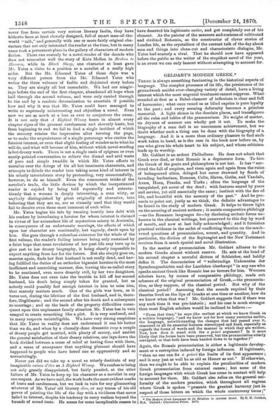A RIGHTED WRONG.*
WE deplore the fact that Mr. Edmund Yates has written an ex- tremely stupid novel, but it is impossible for us not to admit it. Mr. Yates has written a good many novels in his time, and though • A Righted Wroag. A NoveL By Edmund Yates. 3 vols. London: Tinsley. never free from certain very serious literary faults, they have hitherto been at least cleverly designed, full of smart man-of-the- world "talk," and generally with one or more fairly original cha- racters that not only interested the reader at the time, but in many cases took a permanent place in the gallery of characters of modern fiction. There can scarcely be a novel-reader of the decade who does not remember well the story of Kate Mellon in Broken to Harness, while in Black Sheep, one character at least gave Mr. Yates a claim to a position as a novelist of a really high order. But the Mr. Edmund Yates of those days was a very different person from the Mr. Edmund Yates who writes the three volumes of feeble and disjointed story before us. They are simply all but unreadable. We had our misgiv- ings before the end of the first chapter, abandoned all hope when half through the second volume, and were only carried through to the end by a resolute determination to ascertain if possible how and why it was that Mr. Yates could have managed to write so supremely uninteresting and objectless a novel. Even now we are as much at a loss as ever to conjecture the cause. It is not only that A Righted Wrong bears in almost every chapter signs of the grossest carelessness and slovenly haste, but from beginning to end we fail to find a single incident of which the memory retains the impression after turning the page, or to make the acquaintance of a single personage who excites the faintest interest, or even that slight feeling of wonder as to what he will do, and what will become of him, without which novel-reading is but dreary work. There is not a single oasis of epigram or even neatly-pointed conversation to relieve the dismal and arid waste of pure and simple twaddle in which Mr. Yates affects to moralize over the doings of his all but inanimate characters, and attempts to delude the reader into taking some kind of interest in his utterly invertebrate story by pretending, very unsuccessfully, however, to do so himself. Even the commonest tricks of the novelist's trade, the little devices by which the inexperienced reader is cajoled by being told repeatedly and ostenta- tiously that a woman is deeply interesting, a man witty, or anybody distinguished by great originally of character, into believing that they are so, are so clumsily used that they would fail to deceive even those most innocent of such wiles.
Mr. Yates begins his tale by running heavily into debt with his readers by introducing a heroine for whom interest is claimed in virtue of her antecedent life of mysterious misery in Australia, in consequence of an unfortunate marriage, the effects of which upon her charadter are continually, but vaguely, dwelt upon by him. She goes through a colourless existence for the whole of the first volume, the reader's failing interest being only sustained by a faint hope that some revelations of her past life may turn up to give zest to her dreary biography, it being clearly impossible to expect anything from her for the future. But she simply goes on, marries again, finds her first husband is not really dead, and hav- ing fulfilled the duties of an orthodox bigamist heroine in the most inefficient and unexciting manner, dies, leaving the so-called story to be continued, even more drearily still, by her two daughters. Mr. Yates does not even take the trouble to kill off her second husband, his death being simply taken for granted, but as nobody could possibly feel enough interest in him to miss him, that scarcely matters much. One of the girls was born, as it turns out, during the lifetime of the first husband, and is, there- fore, illegitimate ; and the second after his death and a subsequent re-marriage ; and on the basis of the property difficulties conse- quent upon this unpleasant family situation Mr. Yates has in vain essayed to create something like a plot. It is very confused, and in many respects unintelligible. We have very strong suspicions that Mr. Yates in reality does not understand it one bit better than we do, and when by a clumsily-done dramatic coup a couple of dreary people get married, with plenty of money, and amidst the general satisfaction of their dreary relatives, one lays down the book divided between a sense of relief at having done with them, and a sense of annoyance that anything pleasant should have happened to people who have bored one so oppressively and so unremittingly.
Never yet did we take up a novel so utterly destitute of any imaginable raison d'être as A Righted Wrong. We confess to being not only greatly disappointed, but fairly puzzled, at the utter failure of Mr. Yates to keep up his character as a novelist in any one respect. As we have said, the work beats the most evident marks of haste and carelessness, but we look in vain for any glimmering whatever of Mr. Yates' old literary elan, or any traces of his old power of painting the life of the day with a vividness that never failed to interest, despite his tendency to carry realism beyond the bounds of sound taste. He seems for some inexplicable reason to have deserted his legitimate metier, and got completely out of his element. As the painter of the manners and customs of cultivated and civilized Bohemia, as the constructor of clever stories of London life, as the crystallizer of the current talk of the day about men and things into clean-cut and characteristic dialogue, Mr. Yates had scarcely a rival. That he should now have appeared before the public as the writer of the stupidest novel of the year, is an event we can only lament without attemptiog to account for..



































 Previous page
Previous page